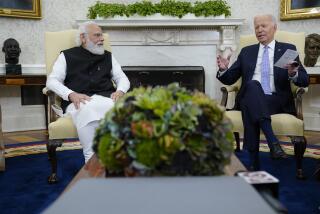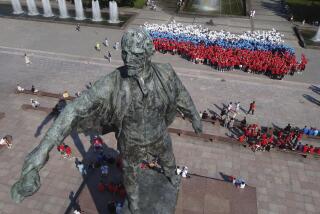In Post-Zia Pakistan, Army Still Holds Sway
NEW DELHI — Gen. Zia ul-Haq was a soldier of faith, not fortune; for him, faith was a matter of personal conviction and public concern. The unusually large number of Pakistani people who attended his funeral regarded the general as a soldier who died in the cause of Islam.
In a sense Pakistan was founded on faith, for Muslims of the Indian subcontinent, under the sway of religious passions and nationalism in the ‘40s, came to believe that their faith could only be preserved in a separate homeland for themselves. No ruler, democratic or authoritarian, pious or profane, has yet been able to separate religion from politics in Pakistan. That bon vivant prime minister, Zulfikar Ali Bhutto, gave in to the clerics by banning drinking and racing--he engaged in both with gusto--in 1977. His Harvard-trained daughter, Benazir Bhutto, takes great care to appear to the people as a pious woman.
Zia sought legitimacy for his authoritarian rule in religion. After he executed Bhutto in 1979, Zia was without any legitimacy in the eyes of many Pakistanis, who saw him as a plain usurper. The Soviet intervention in Afghanistan in December, 1979, gave the Zia regime some rationale for its illegitimate rule, but it was Islam that provided it with legitimacy. He claimed, no doubt out of conviction, to be the defender of the faith at home and in Afghanistan.
The military dictatorship under Zia’s 11-year rule attempted to mold society along religious lines to a degree attempted by none of the regimes in the past. Neither Field Marshal Ayub Khan, in 11 years, 1958 to 1969, of mildly autocratic rule, nor the popularly elected Bhutto from 1971 to 1977, gave religion the political significance that Zia did. He had promised to introduce the Sharia code of Islamic justice before his death and in May erased even the semblance of representative government, by dismissing the government of Prime Minister Mohammed Khan Junejo, on the ground that it stood in the way of his Islamization drive.
Benazir Bhutto is perhaps a little too hopeful when she says that with the death of Zia the “shadow of fear is lifted.” Zia is dead but the military dictatorship as an institution is stronger than ever before. The military commands not only power today but the economy as well: Many top positions in banks, finance and state-owned enterprises are occupied by military personnel; the military’s political allies, like the Muslim League and other small parties, run politics. Powerful economic and political interests stand against the return of democracy. Opposed to the military dictatorship is the overwhelming urge of the Pakistani people for democracy; they look with envy and respect at the world’s largest democracy to the southeast. Both India and Pakistan learned democracy and cricket from the British; the former has made democracy work, the latter has been denied a chance to make it work.
Zia knew very well that the power of the military had to be used--but judiciously and discreetly, so as not to invite a bloody upsurge of all those opposed to him. In managing political dissent, he had skills unsurpassed by any of the generals now running the affairs of 50 or so Third World countries: Never take on all opponents at the same time, play one against the other, co-opt some in the system, keep the lid partially open to vent people’s frustration and resentment--these were the political techniques this soldier of faith employed.
Under Zia’s rule, repression nowhere reached the scale it did under, say, Gen. Emilio Garrastazu Medici in Brazil, Gen. Leopoldo Galtieri in Argentina or Gen. Suharto in Indonesia. Zia was a velvet-gloved dictator; this is where personality in politics matters. Does Ghulam Ishaq Khan, who succeeds Zia, have the skill to manage the regime’s opponents, now poised for the electoral battle set for November? Will it be a party-less or party-based election and will the military permit an election in the first place?
It is too early to answer these questions. Two countries, one a friend, the other a foe of Pakistan, can influence the future course of events. The military regards the United States as its friend, benefactor and a psychological prop. One of the peculiar characteristics of many Third World authoritative elites is to think they need the support of one or the other superpower to stay in power. The Reagan Administration in 1981 entered into a security relationship with the Zia regime for the purposes of repealing the Soviet intervention in Afghanistan and furthering U.S. strategic interests in the oil-rich Persian Gulf. Zia saw this not as just a security relationship but as a kind of endorsement of his regime.
So the United States can, to a degree, pressure the military regime to hold elections as scheduled. Now that the military phase of the Afghan conflict has ended with signing of the Geneva accords last April, Washington is in a position to exercise pressure on Islamabad to permit a full play of democratic processes.
Respect for human rights and abstention from acquiring nuclear weapons were conditions for the American security and economic assistance to Pakistan. The time has come to make Pakistan honor them.
Pakistan’s foe, India, can also create conditions for a peaceful democratic evolution of its neighbor. In 1981, realist Zia offered Prime Minister Indira Gandhi a no-war pact. She spurned it as a trap. Zia’s offer may have been posturing but it was more than likely motivated by realization that hostility toward his vastly stronger neighbor was futile. Everybody knows, despite Delhi’s pathetic denials, that the force ratio between India and Pakistan is heavily weighted in favor of India.
If not peace, even small measures like renunciation of the use of force and limited military disengagement on both sides would deprive the Pakistani military regime of a part of its raison d’etre. India can help Pakistan move toward democracy by becoming a generous and peaceful neighbor. But Delhi under the two Nehrus, Indira Gandhi and Rajiv Gandhi, has found Pak-bashing and America-baiting domestically useful.
More to Read
Sign up for Essential California
The most important California stories and recommendations in your inbox every morning.
You may occasionally receive promotional content from the Los Angeles Times.










